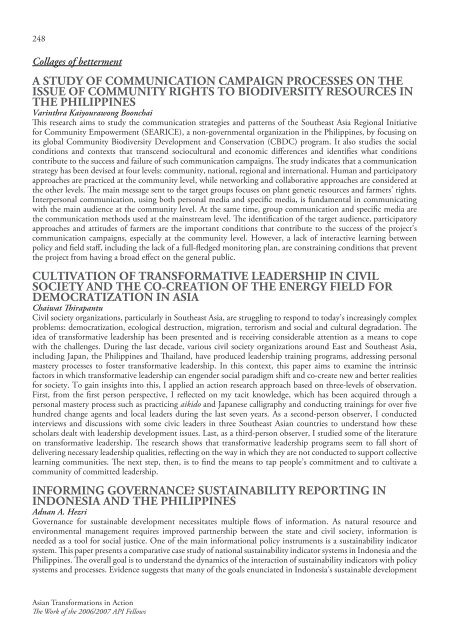Asian Transformations in Action - Api-fellowships.org
Asian Transformations in Action - Api-fellowships.org
Asian Transformations in Action - Api-fellowships.org
You also want an ePaper? Increase the reach of your titles
YUMPU automatically turns print PDFs into web optimized ePapers that Google loves.
248Collages of bettermentA STUDY OF COMMUNICATION CAMPAIGN PROCESSES ON THEISSUE OF COMMUNITY RIGHTS TO BIODIVERSITY RESOURCES INTHE PHILIPPINESVar<strong>in</strong>thra Kaiyourawong BoonchaiThis research aims to study the communication strategies and patterns of the Southeast Asia Regional Initiativefor Community Empowerment (SEARICE), a non-governmental <strong>org</strong>anization <strong>in</strong> the Philipp<strong>in</strong>es, by focus<strong>in</strong>g onits global Community Biodiversity Development and Conservation (CBDC) program. It also studies the socialconditions and contexts that transcend sociocultural and economic differences and identifies what conditionscontribute to the success and failure of such communication campaigns. The study <strong>in</strong>dicates that a communicationstrategy has been devised at four levels: community, national, regional and <strong>in</strong>ternational. Human and participatoryapproaches are practiced at the community level, while network<strong>in</strong>g and collaborative approaches are considered atthe other levels. The ma<strong>in</strong> message sent to the target groups focuses on plant genetic resources and farmers’ rights.Interpersonal communication, us<strong>in</strong>g both personal media and specific media, is fundamental <strong>in</strong> communicat<strong>in</strong>gwith the ma<strong>in</strong> audience at the community level. At the same time, group communication and specific media arethe communication methods used at the ma<strong>in</strong>stream level. The identification of the target audience, participatoryapproaches and attitudes of farmers are the important conditions that contribute to the success of the project’scommunication campaigns, especially at the community level. However, a lack of <strong>in</strong>teractive learn<strong>in</strong>g betweenpolicy and field staff, <strong>in</strong>clud<strong>in</strong>g the lack of a full-fledged monitor<strong>in</strong>g plan, are constra<strong>in</strong><strong>in</strong>g conditions that preventthe project from hav<strong>in</strong>g a broad effect on the general public.CULTIVATION OF TRANSFORMATIVE LEADERSHIP IN CIVILSOCIETY AND THE CO-CREATION OF THE ENERGY FIELD FORDEMOCRATIZATION IN ASIAChaiwat ThirapantuCivil society <strong>org</strong>anizations, particularly <strong>in</strong> Southeast Asia, are struggl<strong>in</strong>g to respond to today’s <strong>in</strong>creas<strong>in</strong>gly complexproblems: democratization, ecological destruction, migration, terrorism and social and cultural degradation. Theidea of transformative leadership has been presented and is receiv<strong>in</strong>g considerable attention as a means to copewith the challenges. Dur<strong>in</strong>g the last decade, various civil society <strong>org</strong>anizations around East and Southeast Asia,<strong>in</strong>clud<strong>in</strong>g Japan, the Philipp<strong>in</strong>es and Thailand, have produced leadership tra<strong>in</strong><strong>in</strong>g programs, address<strong>in</strong>g personalmastery processes to foster transformative leadership. In this context, this paper aims to exam<strong>in</strong>e the <strong>in</strong>tr<strong>in</strong>sicfactors <strong>in</strong> which transformative leadership can engender social paradigm shift and co-create new and better realitiesfor society. To ga<strong>in</strong> <strong>in</strong>sights <strong>in</strong>to this, I applied an action research approach based on three-levels of observation.First, from the first person perspective, I reflected on my tacit knowledge, which has been acquired through apersonal mastery process such as practic<strong>in</strong>g aikido and Japanese calligraphy and conduct<strong>in</strong>g tra<strong>in</strong><strong>in</strong>gs for over fivehundred change agents and local leaders dur<strong>in</strong>g the last seven years. As a second-person observer, I conducted<strong>in</strong>terviews and discussions with some civic leaders <strong>in</strong> three Southeast <strong>Asian</strong> countries to understand how thesescholars dealt with leadership development issues. Last, as a third-person observer, I studied some of the literatureon transformative leadership. The research shows that transformative leadership programs seem to fall short ofdeliver<strong>in</strong>g necessary leadership qualities, reflect<strong>in</strong>g on the way <strong>in</strong> which they are not conducted to support collectivelearn<strong>in</strong>g communities. The next step, then, is to f<strong>in</strong>d the means to tap people’s commitment and to cultivate acommunity of committed leadership.INFORMING GOVERNANCE? SUSTAINABILITY REPORTING ININDONESIA AND THE PHILIPPINESAdnan A. HezriGovernance for susta<strong>in</strong>able development necessitates multiple flows of <strong>in</strong>formation. As natural resource andenvironmental management requires improved partnership between the state and civil society, <strong>in</strong>formation isneeded as a tool for social justice. One of the ma<strong>in</strong> <strong>in</strong>formational policy <strong>in</strong>struments is a susta<strong>in</strong>ability <strong>in</strong>dicatorsystem. This paper presents a comparative case study of national susta<strong>in</strong>ability <strong>in</strong>dicator systems <strong>in</strong> Indonesia and thePhilipp<strong>in</strong>es. The overall goal is to understand the dynamics of the <strong>in</strong>teraction of susta<strong>in</strong>ability <strong>in</strong>dicators with policysystems and processes. Evidence suggests that many of the goals enunciated <strong>in</strong> Indonesia’s susta<strong>in</strong>able development<strong>Asian</strong> <strong>Transformations</strong> <strong>in</strong> <strong>Action</strong>The Work of the 2006/2007 API Fellows
















